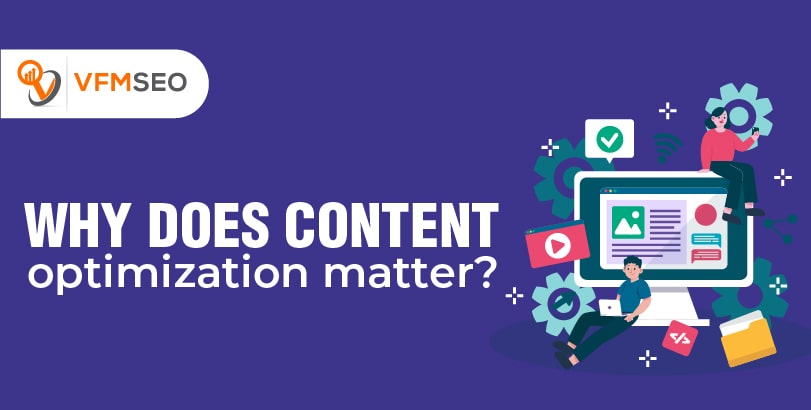
What is Content Optimization & Why it Matters?
Content optimization is the method of making sure your content has the right keywords, multimedia, and other components to show up in search engines.
When doing content optimization for SEO, you’re not only watching for keywords that will help your website’s pages show up for relevant searches, but you’re also making sure what you’re writing and optimizing matches the search purpose of the SERPs (search engine results pages).
Search intent refers to what a user wants to learn when they type a specific keyword into a search engine like Google, and with optimized content, you can be sure that your content tells readers in all the right ways.
What you will be able to do with optimized content is guarantee that you target keywords that mean the most to your industry, attract high-quality potential leads to your website, and tell them on topics that interest them.
The end goals of content optimization, which we’ll elaborate on later in this guide, are to improve your search engine ranking, increase revenue for your business, and become an authority in your field.
If all of that sounds like a tall order to fill, don’t worry — we’ll go over everything you require to know about a successful content optimization campaign on this page.

Why does content optimization matter?
One of the main goals you should optimize your content is for SEO or search engine optimization purposes.
SEO is one of the most powerful Internet marketing strategies available today because it helps your website attract exponential traffic, convert visitors, and make more revenue for your business.
How does SEO work?
SEO is a process that improves your website to rank higher in search engine results pages, driving more traffic to your website. The more users you have coming to your website, the more people will read about your products or services, and the more people you’ll have the opportunity to convert into paying customers.
So, how does content optimization link in with SEO?
The SEO process starts with building informative, beneficial content since it’s that content that will rank in search engine results pages.
There won’t be anything for search engines like Google to rank without solid content creation, so how will you show up in results pages? You won’t! It’s only by way of content that Google will rank you in results pages since your content is what users click when they want to learn more about a topic.
In short, optimized content is key to SEO, and other SEO strategies like internal linking, vital navigation, and the addition of multimedia on your site work hand-in-hand with content to make a result-driving mix.
Understanding SEO and how it goes is crucial to understanding why content optimization is necessary, so here’s a brief outline of other SEO tactics that work together with content optimization:
- Creating a robust internal linking structure: When you create a solid internal linking structure, it means that you link to other buy klonopin no prescription pages on your website within your content. In doing so, you really provide Google with a roadmap of how to get around your website. It also allows Google to find and index all of your pages more immediately, which means they can serve them to the right people in results pages.
- Creating simple navigation on your site: When you make robust navigation, it means that you provide users with a guide to get around your site. Navigation usually appears at the top of your website pages, and it allows users to get the content they’re looking for quickly and easily.
- Adding multimedia: When you add multimedia to your content, it makes it more easily digestible for users since they won’t have to look at a massive wall of text. Multimedia involves things like images, graphics, infographics, videos, and music. If you make videos on YouTube, for instance, you can add those to your content.
- Targeting important keywords: This is another essential SEO strategy that allows you to hone in on your specific audience. When you target exact keywords in your content, you better inform Google what your page is about, allowing Google to serve your pages to the right audience.
To wrap up, a massive part of SEO is the process of creating optimized content for your website, and a vast amount of optimizing your content has to do with SEO strategies. SEO and content optimization go hand-in-hand and are essential for the benefit of the other.
How do you know if you requiContent optimizationre content optimization?
Luckily, it’s pretty simple to tell if your content should use some optimization. Examine out certain red flags that can tell you if your content could benefit from optimization!
- Your content doesn’t rank in results pages: If you’re hard-pressed to see your content on the first page of search results, or even the second or third, your content could majorly benefit from optimization. By optimizing your content with the best keywords, you’ll soon see your page ranking for those key terms.
- Your pages rank low on the first page of outcomes or the second page: We like to ask this low-hanging fruit. In other words, pages that are already ranking, just not well, are great candidates for content optimization because we can more easily increase their ranking with a bit of optimization. Something as simple as adding a key term in some title tags or even adding some copy can support you jump up a few spots in search results.
- Your content doesn’t target any keywords: If your content is a little bit random in terms of what keywords it targets, content optimization could help. With content optimization, you’ll be prepared to hone in on particular keywords that are helpful to your industry. Instead of trying to rank for a ton of random keywords, you’ll be able to rank high for a few important keywords.

